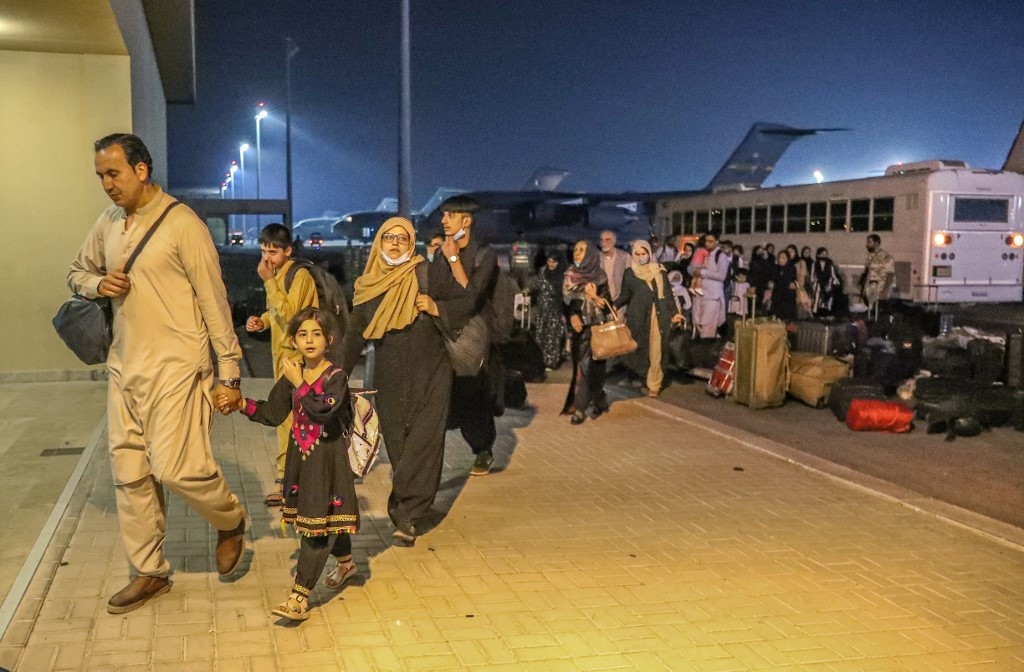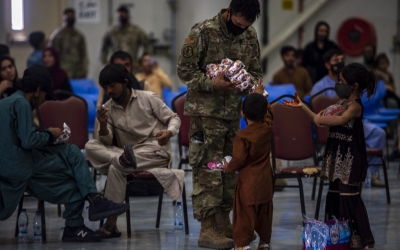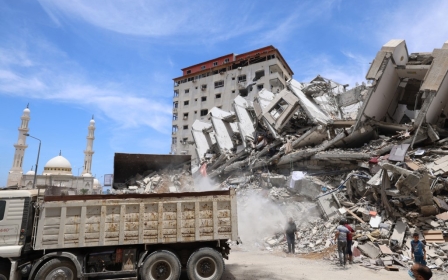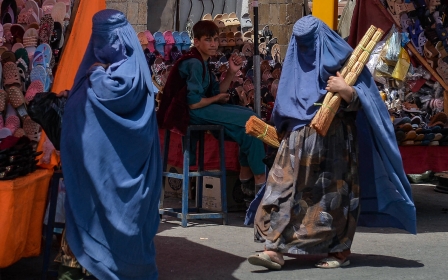Afghan refugees face 'living hell' at US air base in Qatar: Report

The conditions for Afghan refugees at a US air base in Qatar have been described as a "living hell", with urine and fecal matter covering the floors and a rat infestation plaguing the area where they are being housed, according to an email leaked to Axios.
The email, sent by a liaison for the US Central Command (Centcom), said the situation for Afghans in the air base is "a life-threatening humanitarian disaster" and the "current conditions in Doha are of our own doing".
"A humid day today. Where the Afghans are housed is a living hell. Trash, urine, fecal matter, spilled liquids and vomit cover the floors," read an excerpt from the email.
"These human beings are in a living nightmare … We're in the middle of humanitarian crises [sic] that compounds itself with every flight that lands in Doha."
A State Department spokesperson told Middle East Eye that it was working with the Defence Department "closely to address issues as they arise and improve conditions as we learn of concerns".
"We are working quickly to alleviate bottlenecks and are surging consular personnel in Qatar, in addition to expediting manifesting, to alleviate current conditions," the spokesperson said.
The department added that it was "doing everything possible" to process individuals quickly, in order to ensure they stay in Doha for only a brief period.
"When it comes to the timeframe for evacuees remaining at Doha, our goal is to process them for onward destinations within a few days of arrival."
'Nobody's making excuses'
On Monday, MEE reported on a leaked State Department diplomatic cable in which local staff at the US embassy in Kabul criticised the treatment of Afghan refugees at American-run facilities in Qatar.
"Prisoners are treated a hundred times better than us", one staff member lamented, with others noting that there was "un-airconditioned housing with too few lavatories - especially for women".
The temperature in the Gulf country hit a high of 39C on Tuesday, climbing to 42C on Wednesday.
"Nobody's making excuses. Nobody's ducking from this. We recognise that things were, and in many ways still are, not at the level of sanitation and good hygiene that we want," Pentagon spokesperson John Kirby said during a press conference on Tuesday.
"Conditions at Al Udeid [air base in Qatar] could have been better, they are improving," he said.
Centcom said that it had faced challenges keeping up with the flow of evacuees, but it made progress and is "committed to doing more, and to continue to expand and improve our facilities".
Centcom Spokesperson Navy Captain William Urban told MEE it had acquired additional dumpsters, installed 111 portable toilets with 39 more to be added, installed hand washing and sanitising stations, and is offering 7,000 meals three times a day.
'Inadequate forethought' from White House
The leaked email highlights the chaotic nature of the US withdrawal from Afghanistan, and its operations to evacuate US citizens, diplomatic staff and Afghans who aided its mission.
US President Joe Biden and his administration have faced criticism for their handling of the evacuation, which began a day before the Taliban walked into the capital Kabul without firing a shot.
The scenes and accounts of the conditions at al-Udeid also signal that US personnel were not properly prepared to handle the influx of refugees and provide them with a safe and clean environment.
The email was shared with Axios by an anonymous US government official, who criticised the State Department and the White House for their "inadequate forethought and contingency planning" regarding the building of appropriate facilities to house the Afghan refugees.
The White House has, meanwhile, commended the overall evacuation effort.
"You make adjustments and you ultimately get an operation going that is moving out thousands, if not tens of thousands, of people daily. That is what we have accomplished over the course of the week," national security adviser Jake Sullivan said during a White House news briefing on Monday.
"It has not been without its immense difficulties. And we are very mindful of those difficulties. We are clear-eyed about those difficulties."
The US has evacuated more than 37,000 people from Afghanistan since the beginning of its efforts on 14 August, Sullivan said.
Middle East Eye delivers independent and unrivalled coverage and analysis of the Middle East, North Africa and beyond. To learn more about republishing this content and the associated fees, please fill out this form. More about MEE can be found here.






